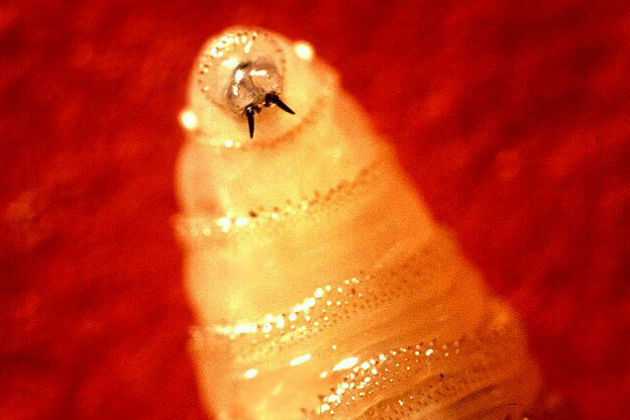Fly-breeding plan aims to halt flesh-eating screwworm threat
Mohan Sinha
24 Jul 2025, 08:57 GMT+10

- In a campaign that sounds more like a science fiction plot than public policy, the U.S. government is preparing to breed billions of sterile flies and release them from planes over Mexico and southern Texas
- The objective is to combat the deadly New World screwworm — a flesh-eating maggot that threatens to wreak havoc on livestock, wildlife, and even household pets
- The targeted pest, the larval form of the New World screwworm fly, feeds on the living tissue of warm-blooded animals
TOPEKA, Kansas: In a campaign that sounds more like a science fiction plot than public policy, the U.S. government is preparing to breed billions of sterile flies and release them from planes over Mexico and southern Texas. The objective? To combat the deadly New World screwworm — a flesh-eating maggot that threatens to wreak havoc on livestock, wildlife, and even household pets.
Though bizarre, this approach has proven effective in the past. The targeted pest, the larval form of the New World screwworm fly, feeds on the living tissue of warm-blooded animals. Female flies lay their eggs in open wounds or mucous membranes, and once hatched, the larvae burrow into flesh, causing severe pain, infection, and — if untreated — death. A single infestation can kill a 1,000-pound cow in under two weeks.
To halt the fly's spread, the U.S. Department of Agriculture (USDA) will release millions of sterile male flies into the wild. These flies, irradiated to prevent fertility, mate with wild females, but no offspring are produced. Over time, the pest population collapses.
"It's an exceptionally good technology," says Edwin Burgess, an entomologist at the University of Florida. "It's one of the great scientific solutions to a large-scale problem."
This method of biological pest control — called the Sterile Insect Technique — was instrumental in eradicating screwworms from the U.S. and much of Central America by the late 20th century. A fly production facility in Panama, jointly operated by the U.S. and regional partners, has served as the front line of defense, keeping the flies contained in South America.
But in late 2024, the screwworm reappeared in southern Mexico, triggering alarms. In response, the USDA plans to expand production by building a new fly factory in southern Mexico by July 2026. Meanwhile, a fly distribution center will open in Texas by the end of this year to receive sterile flies from Panama if needed.
Historically, from 1962 to 1975, over 94 billion sterile flies were released in North America to drive the screwworm to extinction. One biological advantage makes this tactic potent: female screwworm flies mate only once in their short adult lives. Ensuring that the majority of them pair with sterile males effectively halts the reproductive cycle.
Still, the risk is real and immediate. In May, the U.S. temporarily closed its southern border to live imports of cattle, horses, and bison. It may not reopen fully until September. The screwworm can infect any warm-blooded animal — including humans — and its return would be a devastating blow to the beef industry.
Decades ago, the U.S. maintained fly-breeding facilities in Florida and Texas, but those closed after the screwworm was declared eradicated. Now, the USDA wants to scale up again, targeting production of up to 400 million sterile flies per week. This effort will involve US$8.5 million for the Texas distribution hub and $21 million to convert an old fruit fly facility in Mexico.
Producing flies isn't as simple as it sounds. Females must be induced to lay eggs, and larvae need a nutritious diet. Past diets included mixtures of horse meat and honey, and later, blood plasma and egg powder. Once mature, the larvae — resembling dark brown Tic Tacs — are packed into sawdust trays to pupate.
Even logistics carries risk. Last month, a plane distributing flies near Mexico's Guatemala border crashed, killing three crew members. Air drops, typically conducted with light aircraft, still use variations of mid-century methods — either paper cups or crates dispensed through mechanical devices.
Experts warn that once the pest is again under control, the infrastructure should not be dismantled. "Declaring total victory is tempting," says Burgess, "but nature has a way of surprising us. A pest like this can always return."
 Share
Share
 Tweet
Tweet
 Share
Share
 Flip
Flip
 Email
Email
Watch latest videos
Subscribe and Follow
Get a daily dose of Milwaukee Sun news through our daily email, its complimentary and keeps you fully up to date with world and business news as well.
News RELEASES
Publish news of your business, community or sports group, personnel appointments, major event and more by submitting a news release to Milwaukee Sun.
More InformationInternational
SectionMartin Luther King’s children urge caution as records go public
WASHINGTON, D.C.: The Trump administration has released over 240,000 pages of previously sealed FBI records detailing the government's...
Fly-breeding plan aims to halt flesh-eating screwworm threat
TOPEKA, Kansas: In a campaign that sounds more like a science fiction plot than public policy, the U.S. government is preparing to...
Pilots may have shut down wrong engine in Jeju Air Crash, probe shows
SEOUL, South Korea: South Korean investigators probing the deadly Jeju Air crash in December have uncovered what they describe as clear...
Japan’s Sanseito party rides economic discontent to election success
TOKYO, Japan: In a surprising turn in Japan's upper house elections, the fringe far-right Sanseito party emerged as one of the biggest...
Pope decries Israeli military actions in Gaza
CASTEL GANDOLFO, Italy: Pope Leo has issued a heartfelt appeal for an end to the violence in Gaza, condemning what he described as...
Masked ICE agents become symbol of 2025 crackdown
NEW YORK CITY, New York: In recent months, a new and unusual image has become common across the United States: immigration officers...
Wisconsin
SectionCoca-Cola to use cane sugar in US after talks with Trump
WASHINGTON, D.C.: President Donald Trump announced that Coca-Cola has agreed to begin using real cane sugar in its U.S. beverages following...
MLB roundup: Shohei Ohtani extends HR streak as Dodgers edge Twins
(Photo credit: Kiyoshi Mio-Imagn Images) Freddie Freeman hit a game-ending two-run single with two outs in the ninth inning, Shohei...
Packers move Bo Melton from WR to CB for training camp
(Photo credit: Mark Hoffman / Milwaukee Journal Sentinel / USA TODAY NETWORK via Imagn Images) The Green Bay Packers are shifting...
Brewers swat 17 hits to sink Mariners, start new streak
(Photo credit: Stephen Brashear-Imagn Images) Quinn Priester pitched seven solid innings and the Milwaukee Brewers amassed 17 hits...
Brewers hungry to begin new winning streak in series finale with Mariners
(Photo credit: Eric Hartline-Imagn Images) Those working the kitchen at George Webb Restaurants in Wisconsin can turn off the grill....
Behind Matt Shaw, Cubs chase series win vs. Royals
(Photo credit: Kamil Krzaczynski-Imagn Images) The All-Star break provided a welcome respite for Chicago Cubs rookie third baseman...












